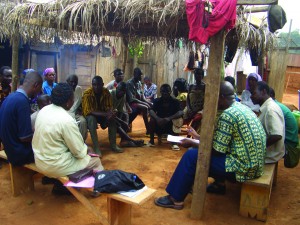Sharing Knowledge to Rebuild Tropical Forests and Landscapes
Tropical forests contain a huge amount of biological diversity, play a key role in human health, offer a vast array of ecosystem services and have become central to global debates on climate change.
 But extensive deforestation and degradation are causing a significant decline in the biological diversity and the ecosystem goods and services provided by them. And, in many African countries there is a notable connection between degradation and the inability of decision makers – and the larger society – to access existing scientific knowledge and innovations that could help reverse the impacts of forest degradation.
But extensive deforestation and degradation are causing a significant decline in the biological diversity and the ecosystem goods and services provided by them. And, in many African countries there is a notable connection between degradation and the inability of decision makers – and the larger society – to access existing scientific knowledge and innovations that could help reverse the impacts of forest degradation.
To address this issue, IUFRO, with its partner institutions in four International Tropical Timber Organization (ITTO)-member African countries – Cameroon, Ghana, Liberia and Nigeria – implemented a project to disseminate scientific information.
The initiative was supported by ITTO through its Thematic Programme on REDDES (Reducing Deforestation and Forest Degradation and Enhancing Environmental Services from Forests).
“Local communities know quite well why their landscape is degraded – but it is hard to address the underlying causes of degradation since this requires changes in various economic sectors involving many different stakeholders,” says Dr. Michael Kleine, IUFRO Deputy Executive Director, and coordinator of IUFRO’s Special Programme for Development of Capacities (SPDC).
“By bringing together all local stakeholders and discussing the situation, a better understanding of the complex land use/degradation issues that exist is developed and this allows the development of realistic strategies aimed at addressing those issues,” he adds.
While admitting that knowledge alone will not lead to successful landscape transformation, “the project clearly shows the useful role of research institutions to lead and-or facilitate multi-stakeholder processes,” says Dr. Ernest Foli, Forest Research Network of Sub-Saharan Africa (FORNESSA) who has been coordinating the project in the region on behalf of IUFRO . “And it also improved professional networking among the four countries, which is another positive step.”
A multitude of factors drive deforestation and forest degradation. Within the forest sector, harvesting, firewood collection, excessive grazing and wildfire are primary causes while population growth and expansion of agricultural land for food and biofuels are major external factors. With that in mind, rather than attempting a scattergun approach, the pilot project identified one top priority issue in each country and focused on that.
“These priorities,” Dr. Kleine says, “also show how far the issue of landscape restoration (and the need for it) has advanced in the four different communities. Some of them, such as Ghana and Cameroon are ready for action, while others need awareness raising first, before people are ready to act or change a prevailing ‘business as usual’ attitude.”
- In Ghana the priority was fire management, involving community-based patrolling for prevention and early detection;
- in Cameroon it was regulating forest extraction, particularly non-timber forest products (NTFPs) and developing community forest practices;
- in Liberia it centered on raising awareness on forest degradation among all stakeholders, expansion of agroforestry and establishing woodlots; and
- in Nigeria the focus was on raising awareness about forest conservation and environmental quality and allocation of land to communities for intensive farming.
The goal of the pilot project was to support efforts to reduce deforestation and forest degradation through the enhancement of socio-economic sustainability and community well-being in forest-dependent areas.
The hope is that at the end of the project the people living in the four REDDES pilot areas will see the need for improving land management – mainly through trees – and, in a not too distant future, enjoy better and more diverse food crops, better water quality and more local jobs and income.
But, successfully reducing deforestation and expanding the area of rehabilitated forests – which is the main focus of REDDES – requires a wide range of measures at national and local levels.
“Having reached, through the project, a common understanding among stakeholders in their specific areas about strategies to be undertaken,” Dr. Foli says, “the next important challenge is to mobilize sufficient political support and funding to put those strategies into action.”
The full report on the project can be found at:
http://www.iufro.org/science/special/spdc/actproj/reddes-main/
The project has generously been funded by the International Tropical Timber Organizations (ITTO): http://www.itto.int/
The results of the REDDES Project will also be presented in the forthcoming IUFRO-SPDC Training Workshop on Science-Policy Interactions “Making Science Work for Forest and Landscape Restoration” to be held in Durban, South Africa from 4-6 September 2015, in conjunction with the World Forestry Congress. For more information visit: http://www.iufro.org/science/special/spdc/actproj/twdurban/
————————————
The International Union of Forest Research Organizations (IUFRO) is the only worldwide organization devoted to forest research and related sciences. Its members are research institutions, universities, and individual scientists as well as decision-making authorities and other stakeholders with a focus on forests and trees. Visit: http://www.iufro.org/
————————————
Special Programme for Development of Capacities (IUFRO-SPDC): http://www.iufro.org/science/special/spdc/
View all IUFRO Spotlights at http://www.iufro.org/media/iufro-spotlights/

Leave a Reply